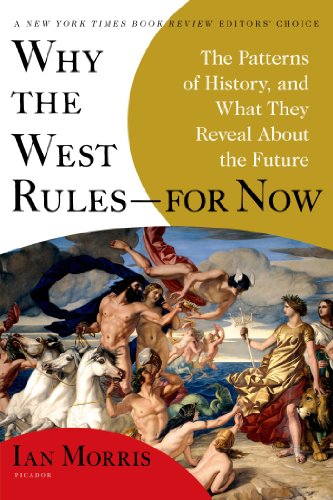
What can history teach us? We know, of course, that history doesn’t repeat itself, at least never exactly. But some, perhaps nearly all, of the most successful leaders of the past were ardent students of history. Surely, they learned something from their predecessors, if only how to make their own mistakes that would be different from those of earlier generations. And we can learn, too. by reading nonfiction books about history, we can better understand who we are and how the world came to be the way it is now. Isn’t that enough?
This post was updated on April 10, 2024.
Other books about history on this site
The books that I’ve listed here do not include My 10 favorite books about business history. Nor do they include those featured in Science explained in 10 excellent popular books or the 10 great biographies. Many of those biographies might also be classified as history, as they cast light on the times in which their subjects lived. But I’m omitting books in all these other categories to avoid duplication.
The best nonfiction books about history I’ve read
The list below begins with my 20 favorite nonfiction books about history (excluding biographies). Following several lists defined (often arbitrarily) by category that include more than 100 good nonfiction books about history. (If I review a book, it almost always means I read and enjoyed the book. I drop those that disappoint me.) Within each of the several lists, titles are all arranged in alphabetical order by the authors’ last names. Each is followed by a linked title to my review.
You may notice that some authors appear more than once on this list. Among those who have written two or more books here are historians Adam Hochschild, Rick Atkinson, and Ben MacIntyre; nonfiction author James Bradley; and journalists Charles C. Mann, David Grann, Erik Larson, and Blaine Harden.
My 20 favorite nonfiction books about history
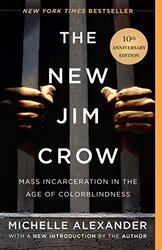
The New Jim Crow: Mass Incarceration in the Age of Colorblindness by Michelle Alexander (2010) 338 pages ★★★★★ — The New Jim Crow: reexamining mass incarceration in America
In this extraordinary book, Prof. Alexander explains how the country’s criminal justice system has been warped to the point of nonrecognition by a series of Presidential actions, Congressional legislation, and Supreme Court decisions; how the system of arrests, prosecution, conviction, and sentencing really works now; and the catastrophic consequences of this sequence of events for our cities, our African-American and Latino communities, and ultimately all of ourselves. The New Jim Crow is one of the most important books published in the English language in a great many years, because it dispels so many of our cherished illusions and takes no prisoners in naming those responsible or in proposing remedies.
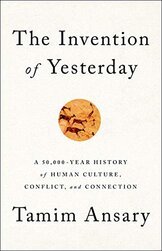
The Invention of Yesterday: A 50,000-Year History of Human Culture, Conflict, and Connection by Tamim Ansary (2019) 448 pages ★★★★★ — Understanding human history as an extraterrestrial might view it
If you think history is a cold recitation of dates and the names of kings and battles, you owe it to yourself to check out Big History. And the best introduction I’ve found to that fascinating new field is Tamim Ansary‘s brilliant 50,000-year survey, The Invention of Yesterday. Unlike many of the pioneering books in Big History, Ansary’s is written in a breezy, conversational style that brings the past to life. And, in never straying from the 30,000-foot perspective that characterizes the field, it’s crammed with insight that’s missing from conventional histories that illuminate the trees but miss the forest. Tamim Ansary will help you understand human history as an extraterrestrial might view it.
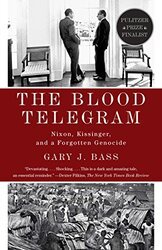
The Blood Telegram: Nixon, Kissinger, and a Forgotten Genocide by Gary J. Bass (2013) 537 pages ★★★★★ – Nixon, Kissinger, and the genocide history has ignored
When Americans today think of Richard Nixon, four or five episodes in his public life usually come to mind: Watergate, the Cambodia invasion, the opening to China, his TV debates with John F. Kennedy, and, perhaps, his kitchen confrontation with Nikita Khrushchev when still Dwight Eisenhower’s vice president. Nixon’s frantic efforts to sanitize his record—including ten books he wrote after resigning from the presidency—and the cult of secrecy that envelops the US government have obscured another history-changing episode: his and Henry Kissinger’s inexcusable collusion in the murder of hundreds of thousands of people in 1971 in what today is Bangladesh.
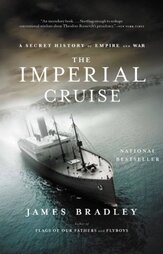
The Imperial Cruise: A Secret History of Empire and War by James Bradley (2009) 401 pages ★★★★☆ – Teddy Roosevelt and the dark side of American foreign policy
Racist attitudes were so prevalent and unchallenged in the U.S. at the turn of the 20th Century that the president of the American Association for the Advancement of Science—the founder of anthropology in the U.S.—could observe, “The Aryan family represents the central stream of progress, because it produced the highest type of mankind, and because it has proved its intrinsic superiority by gradually assuming control of the earth.”
In hindsight, then, it should be no surprise that such celebrated figures as Presidents Theodore Roosevelt and his successor, William Howard Taft, would speak openly about America’s “destiny” to dominate Asia and the Pacific, imposing the benefits of Aryan civilization on the “Pacific niggers” (their term for Filipinos) and “Chinks.” This is the persistent theme of best-selling author James Bradley’s portrayal of Roosevelt and Taft in The Imperial Cruise.
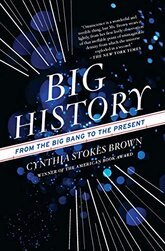
Big History: From the Big Bang to the Present by Cynthia Stokes Brown (2012) 306 pages ★★★★☆ – A new approach to the past
In 1989, an American history professor named David Christian was teaching at Macquarie University in Sydney when he offered a course entitled Big History. Rejecting historians’ definition of the discipline as beginning with the advent of written records just 5,500 years ago, Christian’s course began with the Big Bang, 13.7 billion years in the past. He invited colleagues on the Macquarie faculty to lecture on astronomy, physics, geology, biology, and other scientific disciplines to fill in the billions of years that transpired before any human set foot on our planet. Christian’s course proved popular, and the idea spread to historians in other countries. A new sub-discipline was born. There is now an International Big History Association.
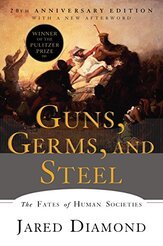
Guns, Germs, and Steel: The Fates of Human Societies by Jared Diamond (1997) 528 pages ★★★★★ – Why is economic development so uneven around the world?
Two decades ago a UCLA geography professor named Jared Diamond published Guns, Germs, and Steel: The Fates of Human Societies. Diamond hypothesized that the arc of human history was dramatically shifted by geographic, environmental, biological, and other factors, resulting in the worldwide dominance of the leading industrial powers during the past 500 years. The book won a 1997 Pulitzer Prize and quickly became a New York Times bestseller.
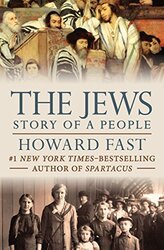
The Jews: Story of a People by Howard Fast (1968) 424 pages ★★★★★ — An account of Jewish history full of surprises
If you’ve been taught that God handed down the Ten Commandments to Moses on Mt. Sinai, and that the Jewish people ever afterward worshiped a single almighty god, you owe it to yourself to read Howard Fast’s extraordinary book, The Jews. As Fast reveals in this eminently readable and endlessly fascinating story, neither of those myths is true—but the true stories are even richer and more compelling. In just four hundred pages, one of the most prolific authors of the twentieth century manages to upend many of the prevailing beliefs about the history of the Jewish people. This is Jewish history full of surprises.
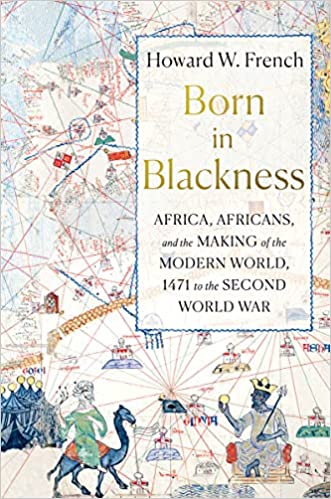
Born in Blackness: Africa, Africans, and the Making of the Modern World, 1471 to the Second World War by Howard W. French (2021) 528 pages ★★★★★ — An eye-opening account of Africa’s pivotal role in world history
We’ve been taught that the modern world dawned when Christopher Columbus arrived in the Caribbean in 1492 in search of a route to the riches of “India.” In fact, for centuries, historians have been telling us that everything changed because explorers from Spain and Portugal set out across the unknown reaches of the seas to establish new trade routes to what we know today as China, Indonesia, and India. Without question, the ensuing Columbian Exchange played a large role in setting off the Great Divergence between East and West. But in Born in Blackness, a compelling new revisionist history, Howard W. French persuasively offers an alternative explanation about the origin of the shift.
“The first impetus for the Age of Discovery,” he writes, “was not Europe’s yearning for ties with Asia, as so many of us have been taught in grade school, but rather its centuries-old desire to forge trading ties with legendarily rich Black societies hidden away somewhere in the heart of ‘darkest’ West Africa.”
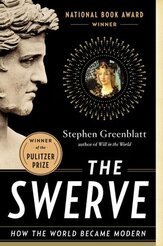
The Swerve: How the World Became Modern by Stephen Greenblatt (2012) 377 pages ★★★★☆ – An historian explains how we came to think the way we do
More than two thousand years ago, some five decades before the year we give the number 1, an extraordinary Roman philosopher-poet named Lucretius wrote a 7,400-line masterpiece named De rerum natura (On the Nature of Things). Lucretius was an ardent follower of the 4th-Century Greek philosopher Epicurus, and his poem is an extraordinary expression of Epicurean philosophy on life, love, sex, the pursuit of happiness, and the nature of the universe.
Epicurus was one of the central figures in the Axial Age (roughly 600 to 200 BCE), which gave the world Buddha, Confucius, Socrates, Plato, and other seminal thinkers across the grand sweep of Asia and Europe. It was Epicurus who laid the foundation for science and the scientific method by his insistence that nothing should be believed unless it could be established through direct observation and logical deduction. Using this logic, he undermined the basis of all the world’s fear-based religions, asserting that the purpose of life was to seek pleasure and the absence of pain.
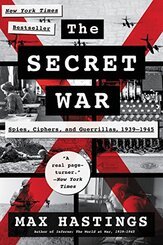
The Secret War: Spies, Ciphers, and Guerrillas, 1939-1945 by Max Hastings (2016) 645 pages ★★★★★ – A revisionist history of intelligence in World War II
Shelves-full of history books have been written about the triumphs of Allied intelligence in World War II. The Ultra Secret. The Man Who Never Was. Operation Mincemeat. Agent Zigag. Double Cross. A Man Called Intrepid. I’ve read all these and many more. (There are hundreds, maybe thousands.) Now comes British journalist and historian Max Hastings with a revisionist view in The Secret War. With his eyes focused on the harsh realities of that all-consuming conflict, Hastings debunks the myths that inspired these books and takes their exaggerations down a peg with a long-lacking sense of perspective. The effect is sobering. This is revisionist history at its best. Anyone who seeks to understand how World War II was really waged should read this book without delay.
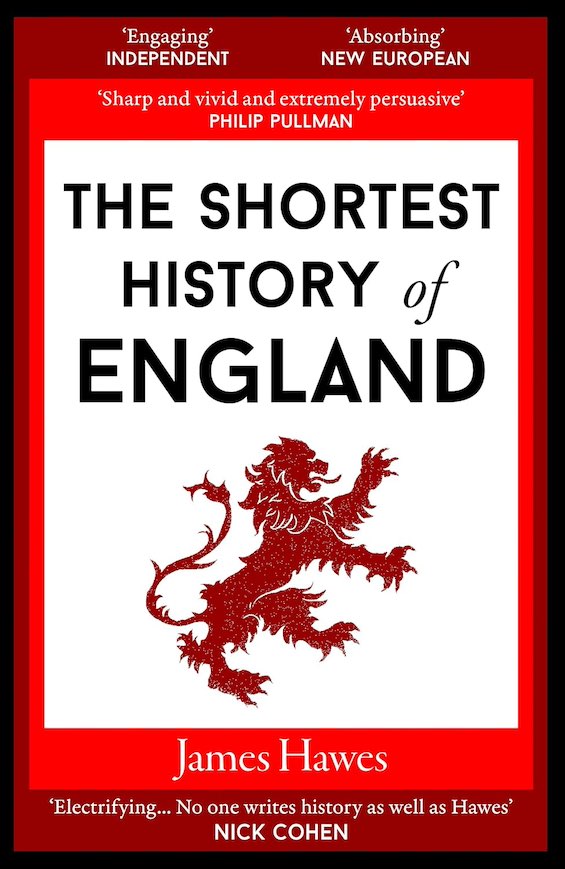
The Shortest History of England: Empire and Division from the Anglo-Saxons to Brexit—A Retelling for Our Times by James Hawes (2020) 270 pages ★★★★★—English history that’s not just about kings and queens
For generations of boys and girls throughout the English-speaking world, British history comes across as one bloody king after another. And you might expect the same from The Shortest History of England, which weighs in at less than three hundred pages. But no. Historian James Hawes offers here a lively presentation, studded with scores of charts, maps, photos, and infographics that spotlight the principal takeaways in the text. The kings are there, and the queens, too. The most important of them, anyway. But Hawes illuminates the trends in society, politics, and the economy that shaped the United Kingdom over its tumultuous, nearly two-thousand-year history. The book is a delight to read. But don’t be fooled. This is not “English History for Dummies.” It’s readable English history. But those boys and girls might have a tough time with this account, which assumes a working knowledge of the world in its readers.
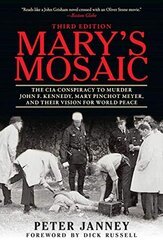
Mary’s Mosaic: The CIA Conspiracy to Murder John F. Kennedy, Mary Pinchot Meyer, and Their Vision for World Peace by Peter Janney (2012) 636 pages ★★★★★ – The CIA murder conspiracy that ended JFK’s plan for peace
The central subject of this extraordinary book is the murder of Mary Pinchot Meyer in October 1964. Mary was the niece of Gifford Pinchot, a Teddy Roosevelt confidante, the first head of the U.S. Forest Service, and a former two-term Governor of Pennsylvania. Previously a journalist, she was a practicing artist in middle age in the early 1960s and prominent in Washington social circles. She was also so striking that practically everyone who spoke about her commented on her beauty. She was JFK’s lover. And the CIA was deeply involved in her murder.
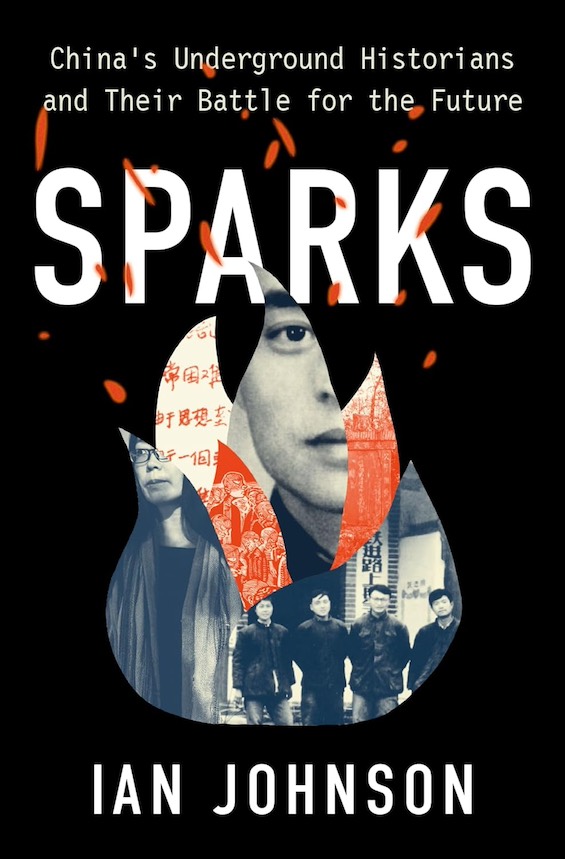
Sparks: China’s Underground Historians and their Battle for the Future by Ian Johnson— Digging out the truth about Mao Zedong
History exerts a powerful force on the present. Why else would battles rage over the historical record around the world? In the United States, for example, some insist slavery was the central driver in our history, while others fight back fiercely. And in Russia, where the Putin regime seeks to downplay Stalin’s crimes while millions of Russians resist, remembering the pain. But nowhere has the war over history been waged with such determination, or the facts so deeply buried, as in China. Journalist Ian Johnson exposes the truth about Chinese history in Sparks. He shows how Xi JInping is rewriting the story of Mao Zedong’s catastrophic campaigns to re-engineer Chinese society. But Johnson doesn’t dwell on the mechanisms of the Party’s totalitarian reach. Instead, he introduces us to those courageous individuals who risk the threat of prison or worse to report and preserve the truth about China’s past.
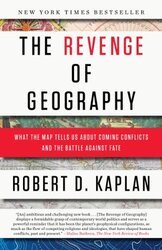
The Revenge of Geography: What the Map Tells Us About Coming Conflicts and the Battle Against Fate by Robert D. Kaplan (2012) 448 pages ★★★★★ – Geopolitical analysis illuminates history and world politics
Through a geopolitical lens, Planet Earth, and the machinations and foibles of earthly leaders, look a lot different than they do in most history books. Stand a few feet away from a globe and squint: if the globe is properly positioned, what you’ll see is one huge, three-tentacled landmass (Asia-Africa-Europe); a second, much smaller one that consists of two parts joined by a narrow connector (North and South America); and several even smaller bits of land scattered about on the periphery (Australia, Greenland, Japan, Indonesia). That’s the world as the Joint Chiefs of Staff must view it. Has to view it.
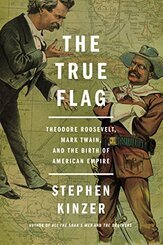
The True Flag: Theodore Roosevelt, Mark Twain, and the Birth of the American Empire by Stephen Kinzer (2017) 320 pages ★★★★★ – The origins of the American empire
In The True Flag: Theodore Roosevelt, Mark Twain, and the Birth of the American Empire, award-winning journalist and author Stephen Kinzer recalls the four-year period 1898-1902, when the United States made its debut as a world power. The central event in this story was the U.S. seizure of Cuba, Guam, Puerto Rico, and the Philippines and the annexation of Hawaii, all in 1898. Kinzer’s thesis is that American entry into war with Spain in 1898 marked the crucial turning point in the protracted and acrimonious debate raised by these events. That brief, inglorious conflict represented the advent of the U.S. as a world power.
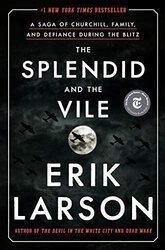
The Splendid and the Vile: A Saga of Churchill, Family, and Defiance During the Blitz by Erik Larson (2020) 546 pages ★★★★★ — An intimate view of Winston Churchill in WW2
The story of Churchill’s courage and his brilliant if unorthodox leadership style is well known. What is less well known is how he managed from day to day to persist in the face of such overwhelming odds during the critical first year of his five years in office. And that’s the story Erik Larson tells, and tells so well, in The Splendid and the Vile. Historians typically zero in on the stuff of politics and policy, and in wartime on the ebb and flow of battle. Not so Erik Larson, one of the most outstanding popular historians writing today in the English language. While all that is present in The Splendid and the Vile, Larson’s focus is on the emotional reality of life in and around 10 Downing Street during that fateful year.
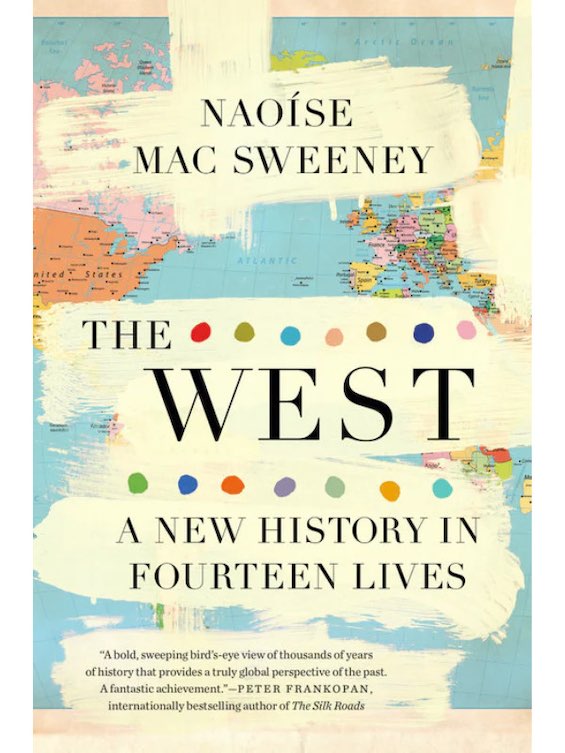
The West: A New History in Fourteen Lives by Naoise Mac Sweeney (2023) 448 pages ★★★★★—Debunking the myth of “Western Civilization”
We imagine “Western history as unfurling unbroken back in time through Atlantic modernity and the European Enlightenment,” writes historian Naoise Mac Sweeney in The West, “back, ultimately, to its origin in the classical worlds of Rome and Greece. This has become the standard version of Western history, both canonical and clichéd. But it is wrong. It is a version of Western history that is both factually incorrect and ideologically driven.” With a sure hand, Mac Sweeney “unpicks and unpacks the grand narrative” known as “Western Civilization” in the four hundred pages of this endlessly fascinating survey.

1491: New Revelations of the Americas Before Columbus by Charles C. Mann (2006) 541 pages ★★★★★ – Astonishing new evidence about the Americas before 1492
As Charles C. Mann explains, in this revised edition of his 2006 bestseller, latter-day investigations by historians, anthropologists, paleontologists, and ecologists have turned up persuasive evidence that the Americas before Columbus were far more heavily populated, the leading civilizations far more sophisticated, and their origins far further back in time than earlier generations of scholars had suspected. And Mann continues his argument in a brilliant followup volume, 1493: Uncovering the New World Columbus Created (After the Columbian Exchange, nothing was ever the same).
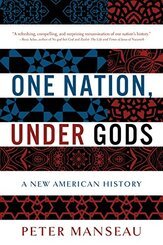
One Nation Under Gods: A New American History by Peter Manseau (2015) 453 pages ★★★★★ – America’s surprising religious history in a highly readable book
If you’ve wondered how anyone could insist that the United States is a “Christian nation” when so many other faiths are practiced within our borders—and so many Americans shun religion entirely—you should enjoy One Nation Under Gods: A New American History by Peter Manseau. In fact, if you yourself believe that claim, it’s even more important that you read this surprising and revealing book. One Nation Under Gods is an ideal companion volume to Howard Zinn’s classic secular history, A People’s History of the United States. Together, the two books provide a well-rounded picture of American history as it really happened, not as we were taught it in high school.
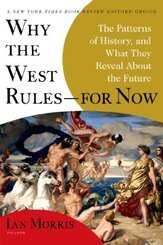
Why the West Rules—for Now: The Patterns of History, and What They Reveal About the Future by Ian Morris (2010) 768 pages ★★★★★ – Is history too important to leave to historians?
While many historians still engaged in the stale debate about whether “Great Men” or social forces are dominant in history, Diamond and Morris convincingly lay out the case for the greater influence of the larger context in which human history takes place, delving not just into geography but also (in Morris’ case) into biology, sociology, and archaeology. In fact, Morris has little patience for the Great Man Theory of History: “the most that any of these great men/bungling idiots did was to speed up or slow down processes that were already under way. None really wrestled history down a whole new path. Even Mao, perhaps the most megalomaniac of all, only managed to postpone China’s industrial takeoff.”
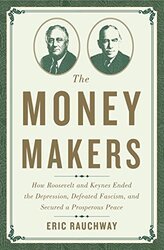
The Money Makers: How Roosevelt and Keynes Ended the Depression, Defeated Fascism, and Secured a Prosperous Peace by Eric Rauchway (2015) 338 pages ★★★★★ – FDR, the gold standard, and the Great Depression
Call it selective memory: we tend to forget that the survival of our democratic system was by no means assured on March 4, 1933, when Franklin Delano Roosevelt was sworn in as president. With the country paralyzed by twenty-five percent unemployment, shuttered factories, insolvent banks, and rapidly falling prices for farm commodities and consumer goods alike, both Communism on the Left and fascism on the Right were rapidly gaining adherents. It was far from clear that a catastrophic clash of the extremes could be prevented. Contemporary events in Europe suggested that even the best-educated and most sophisticated societies could all too easily turn dangerously radical: barely more than a month earlier, Hitler had been named Chancellor of Germany.
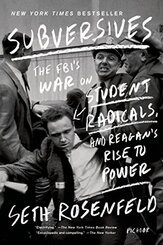
Subversives: The FBI’s War on Student Radicals, and Reagan’s Rise to Power by Seth Rosenfeld (2012) 753 pages ★★★★★ – J. Edgar Hoover, Ronald Reagan, and the violence in 1960s Berkeley
We’ve known for some time that the FBI and Ronald Reagan’s gubernatorial administration were involved in the sometimes-violent conflicts that roiled Berkeley in the 60s. What we didn’t know—or, at least, what I didn’t know—was that J. Edgar Hoover and Ronald Reagan were personally and directly engaged not just in monitoring but in managing the secret government campaigns that helped raise the temperature to the boiling point again and again. Seth Rosenfeld’s exhaustively researched recent book, Subversives, documents this story in often minute detail yet manages to keep it eminently readable.
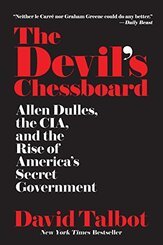
The Devil’s Chessboard: Allen Dulles, the CIA, and the Rise of America’s Secret Government by David Talbot (2015) 652 pages ★★★★★ – When America’s secret government ran amok
The historical record reveals a great deal about Allen Dulles’ career in espionage, highlighting his central role in the overthrow of the Iranian and Guatemalan governments in 1953 and 54, in the notorious MKULTRA program that administered mind-altering drugs to unwitting subjects in at least seven countries, and in the disastrous Bay of Pigs invasion of Cuba in 1961.
Recently, The Brothers, Stephen Kinzer’s dual biography of Dulles and his older brother, Secretary of State John Foster Dulles, also spotlighted the two men’s unsavory roles in funneling American capital to help build Hitler’s Germany and in the CIA’s attempts to assassinate Gamal Abdel Nasser in Egypt, Sukarno in Indonesia, Ho Chi Minh in Vietnam, Patrice Lumumba in the Congo, and Fidel Castro in Cuba. Now, Talbot has delved more deeply into the record and taken a far more critical look at Dulles’ career. The picture that emerges is shattering.
Good nonfiction books about history: World War II
American Heritage History of World War II by Steven E. Ambrose and C. L. Sulzberger—The best short history of World War II
The Day of Battle: The War in Sicily and Italy, 1943-44 by Rick Atkinson – Friendly fire and bumbling generals in WWII
The Guns at Last Light: The War in Western Europe, 1944-1945 by Rick Atkinson – “The greatest catastrophe in human history”
Year Zero: A History of 1945 by Ian Buruma – The fateful year when the world stepped back from war
Tuxedo Park: A Wall Street Tycoon and the Secret Palace of Science that Changed the Course of World War II by Jennet Conant—The amateur scientist who helped deliver radar and the atomic bomb
The Unwanted: America, Auschwitz, and a Village Caught in Between by Michael Dobbs — Did FDR betray the Jews of Europe?
Man’s Search for Meaning by Viktor E. Frankl – From the ashes of the Holocaust, a gift of lessons for living
The Secrets of the Notebook: A Woman’s Quest to Uncover Her Royal Family Secret by Eve Haas—One woman’s obsessive quest to learn how her grandmother died in the Holocaust
The Secret War: Spies, Ciphers, and Guerrillas, 1939-1945 by Max Hastings – A revisionist history of intelligence in World War II
Operation Chastise: The RAF’s Most Brilliant Attack of World War II by Max Hastings—Bomber Command’s most successful attack on Nazi Germany was not on its cities
The Nazi Menace: Hitler, Churchill, Roosevelt, Stalin, and the Road to War by Benjamin Carter Hett—How the Western democracies stumbled into war with Nazi Germany
Normandy ’44: D-Day and the Epic 77-Day Battle for France by James Holland—Debunking the myths about D Day and Normandy
12 Seconds of Silence: How a Team of Inventors, Tinkerers, and Spies Took Down a Nazi Superweapon by Jamie Holmes—The WWII technology breakthrough with the proximity fuse
The Daughters of Yalta: The Churchills, Roosevelts, and Harrimans, a Story of Love and War by Catherine Grace Katz—The Yalta controversy and the fate of Poland
The Bastard Brigade: The True Story of the Renegade Scientists and Spies Who Sabotaged the Nazi Atomic Bomb by Sam Kean—The secret mission to stop the Nazi atomic bomb
Engineers of Victory: The Problem-Solvers Who Turned the Tide in the Second World War by Paul Kennedy – The problem-solvers who won World War II
The Saboteur: The Aristocrat Who Became France’s Most Daring Anti-Nazi Commando by Paul Kix—A story of an anti-Nazi commando worthy of Hollywood
The Last Ditch: Britain’s Secret Resistance and the Nazi Invasion Plans by David Lampe—Why Hitler didn’t invade Great Britain
In the Garden of Beasts: Love, Terror, and an American Family in Hitler’s Berlin by Erik Larson – Why the U.S. failed to speak out against the rise of Hitler’s Germany
Churchill’s Shadow Raiders: The Race to Develop Radar, WWII’s Invisible Secret Weapon by Damien Lewis—How German radar technology helped Britain win World War II
Double Cross: The True Story of the D-Day Spies by Ben MacIntyre – A new spin on why the Normandy invasion succeeded
Operation Mincemeat: How a Dead Man and a Bizarre Plan Fooled the Nazis and Assured Allied Victory by Ben MacIntyre – How the Allies fooled the Nazis with a corpse and assured victory
Rogue Heroes: The History of the SAS, Britain’s Secret Special Forces Unit that Sabotaged the Nazis and Changed the Nature of War by Ben MacIntyre – The story of the original special forces
War: How Conflict Shaped Us by Margaret MacMillan—A scholar surveys armed conflict through the ages
Forgotten Ally: China’s World War II, 1937-1945 by Rana Mitter—A gripping history of China in World War II
Four Lost Cities: A Secret History of the Urban Age by Annalee Newitz—Join archaeologists at work around the world
Madame Fourcade’s Secret War: The Daring Young Woman Who Led France’s Largest Spy Network Against Hitler by Lynne Olson—The truth about the French Resistance, dug out of old records
A Game of Birds and Wolves: The Ingenious Young Women Whose Board Game Helped Win World War II by Simon Parkin—How wargames helped win World War II
From Kraków to Berkeley: Coming Out of Hiding by Anna Rabkin—“Survival is sweet revenge:” The odyssey of a Holocaust survivor
The Last Jew of Treblinka by Chil Rajchman—A moving death camp survivor’s memoir
The Order of the Day by Éric Vuillard—The men who made Adolf Hitler’s war possible
Wild Bill Donovan: The Spymaster Who Created the OSS and Modern American Espionage by Douglas Waller—The remarkable spymaster who launched the US into espionage
1944: FDR and the Year That Changed History by Jay Winik – The sad story of FDR’s complicity with the Holocaust
Good nonfiction books about history: American history
The New Jim Crow: Mass Incarceration in the Age of Colorblindness by Michelle Alexander — The New Jim Crow: reexamining mass incarceration in America
The Lords of Creation: The History of America’s 1 Percent by Frederick Lewis Allen—Why the Great Recession happened—and the Great Depression before it
Fantasyland: How America Went Haywire by Kurt Andersen – Conspiracy theories, fake news, and other delusions in American history
Boom Town: The Fantastical Saga of Oklahoma City, Its Chaotic Founding… Its Purloined Basketball Team, and the Dream of Becoming a World-class Metropolis by Sam Anderson—America revealed through the lens of a single mid-sized city
The Blood Telegram: Nixon, Kissinger, and a Forgotten Genocide by Gary J. Bass – Nixon, Kissinger, and the genocide history has ignored
“The Rest of Us”: The Rise of America’s Eastern European Jews by Stephen Birmingham—Start here to understand Jews in America
Republican Gomorra: Inside the Movement That Shattered the Party by Max Blumenthal – When religion dominated the views of American conservatives
The Imperial Cruise: A Secret History of Empire and War by James Bradley – Teddy Roosevelt and the dark side of American foreign policy
The China Mirage: The Hidden History of American Disaster in Asia by James Bradley – “Who lost China?” Nobody.
The Black Calhouns: From Civil War to Civil Rights with One African American Family by Gail Lumet Buckley – Living the African-American experience
The Longest War: Inside the Enduring Conflict Between America and Al-Qaeda by Peter L. Bergen – The conflict between the U.S. and Al Qaeda
Black Against Empire: The History and Politics of the Black Panther Party by Joshua Bloom and Waldo E. Martin III – Berkeley in 1969: Black Panthers, the FBI, and the Vietnam War
Asian American Histories of the United Statesby Catherine Ceniza Choy—An Asian American history book focused on the present
Let the People Rule: Theodore Roosevelt and the Birth of the Presidential Primary by Geoffrey Cowan—Teddy Roosevelt: progressive, champion of primary elections, and a racist
The Twilight War: The Secret History of America’s Thirty-Year Conflict with Iran by David Crist – The ugly US-Iran war, past, present, and future
The Jews in America by Max I. Dimont—A brilliant account of Jewish history in America
Golden Gates: Fighting for Housing in America by Conor Dougherty—Why are so many homeless in America?
Jefferson’s Second Revolution: The Election Crisis of 1800 and the Triumph of Republicanism by Susan Dunn—America’s first existential election
Zeitoun by Dave Eggers – Life in the maelstrom of Hurricane Katrina
Cuba: An American History by Ada Ferrer—American history through a Cuban lens
The Teacher Wars: A History of America’s Most Embattled Profession by Dana Goldstein – Teacher training, normal schools, and “bad teachers”
Killers of the Flower Moon: The Osage Murders and the Birth of the FBI by David Grann – The case that helped put the FBI on the map
Game Change: Obama and the Clintons, McCain and Palin, and the Race of a Lifetime by John Heilemann and Mark Halperin – A stirring account of the watershed 2008 election
Rebel Cinderella: From Rags to Riches to Radical, the Epic Journey of Rose Pastor Stokes by Adam Hochschild—Early 20th-century America viewed through the life of one extraordinary woman
American Midnight: The Great War, a Violent Peace, and Democracy’s Forgotten Crisis by Adam Hochschild—Repression, censorship, and official violence in the First Red Scare
How to Hide an Empire: A History of the Greater United States by Daniel Immerwahr—A supremely entertaining history of American empire
Mary’s Mosaic: The CIA Conspiracy to Murder John F. Kennedy, Mary Pinchot Meyer, and Their Vision for World Peace by Peter Janney – The CIA murder conspiracy that ended JFK’s plan for peace
What It Took to Win: A History of the Democratic Party by Michael Kazin—A stirring history of the Democratic Party
The Edge of Anarchy: The Railroad Barons, the Gilded Age, and the Greatest Labor Uprising in America by Jack Kelly—The American labor movement in the Gilded Age
The True Flag: Theodore Roosevelt, Mark Twain, and the Birth of the American Empire by Stephen Kinzer – The origins of the American empire
Transaction Man: The Rise of the Deal and the Decline of the American Dream by Nicholas Lemann—Economic inequality deconstructed in a brilliant historical study
Neither Snow nor Rain: A History of the United States Postal Service by Devin Leonard – An entertaining history of the post office
Dead Wake: The Last Crossing of the Lusitania by Erik Larson – When a U-boat sank the Lusitania and changed history
Democracy in Chains: The Deep History of the Radical Right’s Stealth Plan for America by Nancy MacLean – Historical perspective on “the vast Right-Wing conspiracy”
One Nation Under Gods: A New American History by Peter Manseau – America’s surprising religious history in a highly readable book
The Address Book: What Street Addresses Reveal About Identity, Race, Wealth, and Power by Deirdre Mask—Who knew that street addresses meant so much?
Dark Money: The Hidden History of the Billionaires Behind the Rise of the Radical Right by Jane Mayer — How the Koch brothers are revolutionizing American politics
A Country of Vast Designs: James K. Polk, the Mexican War, and the Conquest of the American Continent by Robert W. Merry – The President who launched the Mexican-American War
The Guarded Gate: Bigotry, Eugenics, and the Law That Kept Generations of Jews, Italians, and Other European Immigrants Out of America by Daniel Okrent—The racist movement that stopped immigration a century ago
Right Out of California: The 1930s and the Big Business Roots of Modern Conservatism by Kathryn S. Olmsted – How today’s conservatism grew in the cotton fields of California
A Bright and Guilty Place: Murder, Corruption, and L.A.’s Scandalous Coming-of-Age by Richard Rayner – Murder and corruption under Hollywood’s bright lights
Infamy: The Shocking Story of the Japanese-American Internment in World War II by Richard Reeves – The shameful story of Japanese-American Internment in WWII
Top Secret America: The Rise of the New American Security State by Dana Priest and William M. Arkin — The shocking reality behind the secret US war on “terror”
Subversives: The FBI’s War on Student Radicals, and Reagan’s Rise to Power by Seth Rosenfeld – J. Edgar Hoover, Ronald Reagan, and the violence in 1960s Berkeley
Counterstrike: The Untold Story of America’s Secret Campaign Against Al Qaeda by Eric Schmitt and Thom Shanker – Understanding the secret American campaign against Al Qaeda
Game Changers: Twelve Elections That Transformed California by Steve Swatt, with Susie Swatt, Jeff Raimundo, and Rebecca LaVally – 12 elections that were game changers
Season of the Witch: Enchantment, Terror, and Deliverance in the City of Love by David Talbot – From the Summer of Love to the Jonestown massacre
The Devil’s Chessboard: Allen Dulles, the CIA, and the Rise of America’s Secret Government by David Talbot – When America’s secret government ran amok
The Outpost: An Untold Story of American Valor by Jake Tapper – How the U.S. military wages war in Afghanistan
Corruption in America: From Benjamin Franklin’s Snuff Box to Citizens United by Zephyr Teachout – Citizens United, bribery, and corruption in America
American Heiress: The Wild Saga of the Kidnapping, Crimes, and Trial of Patty Hearst by Jeffrey Toobin – The kidnapping that shook America
Kill Anything That Moves: The Real American War in Vietnam by Nick Turse – A wrenching view of how the U.S. military fought the Vietnam War
Good nonfiction books about history: Big History
A Most Improbable Journey: A Big History of Our Planet and Ourselves by Walter Alvarez – The unlikely story of life on Earth
The Invention of Yesterday: A 50,000-Year History of Human Culture, Conflict, and Connection by Tamim Ansary—Understanding human history as an extraterrestrial might view it
Empire of Cotton: A Global History by Sven Beckert – Capitalism reexamined from an historical perspective
The World in a Grain: The Story of Sand and How It Transformed Civilization by Vince Beiser—We never think about it, but our civilization is built on sand
Big History: From the Big Bang to the Present by Cynthia Stokes Brown – A new approach to the past
Origin Story: A Big History of Everything by David Christian—A survey of Big History by the man who created the field
A Farewell to Alms: A Brief Economic History of the World, by Gregory Clark—Why is the Global North so much richer than the South?
Origins: How Earth’s History Has Shaped Human History by Lewis Dartnell—How geology has shaped the human experience
Guns, Germs, and Steel: The Fates of Human Societies by Jared Diamond – Why is economic development so uneven around the world?
The Lost City of Z: A Tale of Deadly Obsession in the Amazon by David Grann—Pre-Columbian civilization in the Amazon
The Year 1000: When Explorers Connected the World—and Globalization Began by Valerie Hansen—When did globalization begin?
Sapiens: A Brief History of Humankind, by Yuval Noah Harari – Exploring the arc of history over 70,000 years
Paper: Paging Through History by Mark Kurlansky – More than you ever wanted to know about the history of paper
1491: New Revelations of the Americas Before Columbus by Charles C. Mann – Astonishing new evidence about the Americas before 1492
1493: Uncovering the New World Columbus Created by Charles C. Mann – After the Columbian Exchange, nothing was ever the same
Why the West Rules—for Now: The Patterns of History, and What They Reveal About the Future by Ian Morris – Is history too important to leave to historians?
Against the Grain: A Deep History of the Earliest States by James C. Scott – This book will challenge everything you know about ancient history
1688: A Global History by John E. Wills Jr.—Viewing humanity as a whole through the lens of history
Good nonfiction books about history: espionage and cyber war
The Angel: The Egyptian Spy Who Saved Israel by Uri Bar-Joseph – An extraordinary episode in Israeli history
In the Enemy’s House: The Secret Saga of the FBI Agent and the Code Breaker Who Caught the Russian Spies by Howard Blum – How the Soviet atomic spies were caught
The Spy Who Couldn’t Spell: A Dyslexic Traitor, an Unbreakable Code, and the FBI’s Hunt for America’s Stolen Secrets by Yudhijit Bhattacharjee – Before Edward Snowden was “The Spy Who Couldn’t Spell”
The Zhivago Affair: The Kremlin, the CIA, and the Battle Over a Forbidden Book by Peter Finn and Petra Couvée—How a novel helped speed the collapse of the Soviet Union
The Billion Dollar Spy: A True Story of Cold War Espionage and Betrayal by David E. Hoffman – A gripping true-life tale of Cold War spycraft
Dark Territory: The Secret History of Cyber War by Fred Kaplan — The secret history of cyber war
Avenue of Spies: A True Story of Terror, Espionage, and One American Family’s Heroic Resistance in Nazi-Occupied Europe by Alex Kershaw – A revealing account of life under the Nazis in occupied Europe
Surveillance Valley: The Secret Military History of the Internet by Yasha Levine – Shocking revelations: the secret military history of the Internet
Patriotic Betrayal: The Inside Story of the CIA’s Secret Campaign to Enroll American Students in the Crusade Against Communism by Karen M. Paget – How the CIA infiltrated the National Student Association
From Warsaw With Love: Polish Spies, the CIA, and the Forging of an Unlikely Alliance by John Pomfret—The long-lasting alliance between Polish spies and the CIA
Operation Shakespeare: The True Story of an Elite International Sting by John Shiffman – How Homeland Security went abroad to capture an Iranian arms dealer
Spies in Palestine: Love, Betrayal, and the Heroic Life of Sarah Aaronsohn by James Srodes—The female Jewish spy who helped pave the way to the State of Israel
Good books about history: European history
Versailles: A History by Robert B. Abrams—History versus fiction: How Netflix’s Versailles distorts the facts
The Nazi Seizure of Power: The Experience of a Single German Town, 1922-1945, Revised Edition by William Sheridan Allen—Explaining the Nazi seizure of power
Victoria, the Queen: An Intimate Biography of the Woman Who Ruled an Empire by Julia Baird—An eye-opening biography of Queen Victoria
The Sleepwalkers: How Europe Went to War in 1914 by Christopher Clark – Does history repeat itself? A Cambridge University historian wonders
Life in Medieval Europe: Fact and Fiction by Danièle Cybulskie—How people really lived in Medieval Europe
Conan Doyle for the Defense: The True Story of a Sensational British Murder, a Quest for Justice, and the World’s Most Famous Detective Writer by Margalit Fox – How Sherlock Holmes foreshadowed today’s “scientific detecting”
The Bright Ages: A New History of Medieval Europe by Matthew Gabriele and David M. Perry—A fresh look at the history of the Middle Ages
The Future Is History: How Totalitarianism Reclaimed Russia by Masha Gessen—The road to autocracy in Putin’s Russia
The Wager: A Tale of Shipwreck, Mutiny, and Murder by David Grann—This bestselling maritime drama is hard to put down
The House by the Lake: One House, Five Families, and a Hundred Years of German History by Thomas Harding – An intimate take on 20th-century German history
The Shortest History of England: Empire and Division from the Anglo-Saxons to Brexit—A Retelling for Our Times by James Hawes—English history that’s not just about kings and queens
To End All Wars: A Story of Loyalty and Rebellion, 1914-1918 by Adam Hochschild – World War I: Learning history the hard way
Spain in Our Hearts: Americans in the Spanish Civil War, 1936-1939 by Adam Hochschild — The American role in the Spanish Civil War
The Fall of the Roman Empire: A New History of Rome and the Barbarians by Peter Heather – Roman generals, barbarians, and a compulsive historian to tell the tale
The Death of Democracy: Hitler’s Rise to Power and the Downfall of the Weimar Republic by Benjamin Carter Hett – How democracy died in Germany: is there a lesson for America today?
Powers and Thrones: A New History of the Middle Ages by Dan Jones—Change in the Middle Ages came thick and fast
The Plantagenets: The Warrior Kings and Queens Who Made England by Dan Jones—The many great stories of Britain’s bloodiest dynasty
Odessa: Genius and Death in a City of Dreams by Charles King—The roots of antisemitism lay deep in the Russian Empire
Bess of Hardwick: Empire Builder by Mary S. Lovell—She was the most powerful woman after the Queen
1919 Versailles: The End of the War to End All Wars by Charles L. Mee, Jr.—The World War I peace treaty that led to World War II
A Very English Scandal: Sex, Lies, and a Murder Plot at the Heart of the Establishment by John Preston – The political scandal that roiled the British Establishment
Hell and Good Company: The Spanish Civil War and the World It Made, by Richard Rhodes – An outsider’s take on the Spanish Civil War
The White Ship: Conquest, Anarchy, and the Wrecking of Henry I’s Dream by Charles Spencer—When anarchy reigned in England
Pogrom: Kishinev and the Tilt of History by Steven J. Zipperstein – In a prelude to the Holocaust, the Kishinev pogrom shocked the world
Good books about history: economic and business history
Lords of Finance: The Bankers Who Broke the World by Liaquat Ahamed—How the gold standard caused the Great Depression
The Summit: Bretton Woods, 1944: J. M. Keynes and the Reshaping of the Global Economy by Ed Conway – The clashing personalities determined our economic history
The Mystery of Capital: Why Capitalism Triumphs in the West and Fails Everywhere Else by Hernando de Soto – Hernando de Soto on property rights, capitalism, and inequality
The Innovators: How a Group of Hackers, Geniuses, and Geeks Created the Digital Revolution by Walter Isaacson – A human-centered history of the Digital Revolution
The Pentagon’s Brain: An Uncensored History of DARPA, America’s Top-Secret Military Research Agency by Annie Jacobsen – The mind-boggling story of America’s top-secret military research
Money: The Unauthorized Biography—From Coinage to Cryptocurrencies by Felix Martin – Misunderstanding money helped cause the Great Recession
The Money Makers: How Roosevelt and Keynes Ended the Depression, Defeated Fascism, and Secured a Prosperous Peace by Eric Rauchway – FDR, the gold standard, and the Great Depression
Good books about history: Asian history
The Patient Assassin by Anita Anand – The story of the Amritsar Massacre that sped up the Indian independence movement
Destiny Disrupted: A History of the World Through Islamic Eyes by Tamim Ansary – The Islamic perspective on history
Zealot: The Life and Times of Jesus of Nazareth by Reza Aslan – Jesus of Nazareth and the origins of anti-Semitism
A History of Future Cities by Daniel Brook—Urbanization, globalization and the future of humanity
Occidentalism: The West in the Eyes of Its Enemies by Ian Buruma and Avishai Margalit – Why do so many people hate Western values?
Big Sister, Little Sister, Red Sister: Three Women at the Heart of Twentieth-Century China by Jung Chang—They shaped twentieth-century Chinese history
A Kim Jong-Il Production: The Extraordinary True Story of a Kidnapped Filmmaker, His Star Actress, and a Young Dictator’s Rise to Power by Paul Fischer – Kim Jong Il’s North Korea from the inside out
Spies of No Country: Secret Lives at the Birth of Israel by Matti Friedman—An amazing true story of Israeli spies in the country’s War of Independence
Midnight’s Furies: The Deadly Legacy of India’s Partition by Nisid Hajari—An insightful history of the Indian Partition
Escape from Camp 14: One Man’s Remarkable Odyssey from North Korea to Freedom in the West by Blaine Harden – A survivor’s eye-opening tale of life in the North Korean gulag
The Great Leader and the Fighter Pilot: The True Story of the Tyrant Who Created North Korea and the Young Lieutenant Who Stole His Way to Freedom by Blaine Harden – Blaine Harden: how North Korea came to be what it is today
A River in Darkness: One Man’s Escape from North Korea by Masaji Ishikawa—Escape from North Korea: a first-person account
Incarnations: A History of India in Fifty Lives by Sunil Khilnani – Indian history portrayed through biography
The Tatas: How a Family Built a Business and a Nation by Girish Kuber—How India’s Tata family built modern India
A Force So Swift: Mao, Truman, and the Birth of Modern China, 1949 by Kevin Peraino – Mao, Truman, and the birth of Modern China
The Beautiful Country and the Middle Kingdom by John Pomfret – A revealing history of U.S.-China relations
China in World History by Paul S. Ropp – Chinese history in less than 200 pages
My Promised Land: The Triumph and Tragedy of Israel by Ari Shavit – A prominent Israeli columnist’s sober assessment: Will Israel survive?
Nabeel’s Song: A Family Story of Survival in Iraq by Jo Tatchell – The Iraqi view of life under Saddam Hussein
The Peking Express: The Bandits Who Stole a Train, Stunned the West, and Broke the Republic of Chinaby James M. Zimmerman—When bandits toppled China’s government
Other good nonfiction books about history
Anatomy of a Genocide: The Life and Death of a Town Called Buczacz by Omer Bartov—The Holocaust under the microscope of history
Library: An Unquiet History by Matthew Battles—An impressionistic history of libraries and librarians through the ages
Nemesis: One Man and the Battle for Rio by Misha Glenny – An intimate look at drug trafficking in Brazil
The Lost City of Z: A Tale of Deadly Obsession in the Amazon by David Grann – Pre-Columbian civilization in the Amazon
The Swerve: How the World Became Modern by Stephen Greenblatt – An historian explains how we came to think the way we do
When Money Talks: A History of Coins and Numismatics by Frank L. Holt – How the study of coins has enriched history
Extra Life: A Short History of Living Longer by Steven Johnson—Why are people living so much longer these days?
The Revenge of Geography: What the Map Tells Us About Coming Conflicts and the Battle Against Fate by Robert D. Kaplan – A thought-provoking view of world politics
The Shadow of the Sun by Ryszard Kapuscinski – How Africa came to be what it is today
War and Conflict in the Middle Agesby Stephen Morillo—A global view of war in the Middle Ages
Factfulness: Ten Reasons We’re Wrong About the World—and Why Things Are Better Than You Think by Hans Rosling, with Ola Rosling and Anna Rosling Rönnlund—The facts, just the facts, about the world as it really is
The Story of the Jews: Finding the Words, 1000 BC – 1492 AD by Simon Schama – Simon Schama on Jewish history from 1000-1492
Pale Rider: The Spanish Flu of 1918 and How It Changed the World by Laura Spinney – Was the Spanish Flu of 1918 a greater disaster than World War II?
How Fascism Works: The Politics of Us and Them by Jason Stanley—Donald Trump’s playbook revealed in a penetrating new book, “How Fascism Works”
Do Not Disturb: The Story of a Political Murder and an African Regime Gone Bad by Michela Wrong—Why does the West support an African regime gone bad?
For related reading
This post is one of My 10 top reading recommendations.
You may also be interested in my posts, Good books about the Holocaust, and 10 top nonfiction books about World War II. And check out Good books about the Middle Ages.
If you enjoy reading history in fictional form, check out 20 most enlightening historical novels. And if you’re looking for exciting historical novels, check out Top 10 historical mysteries and thrillers.
Also, you can always find my most popular reviews, and the most recent ones, on the Home Page.

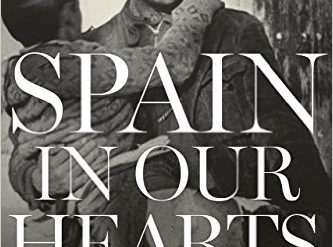

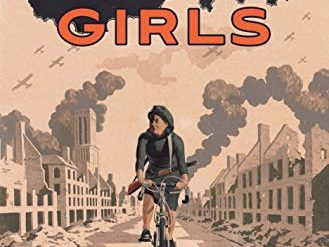
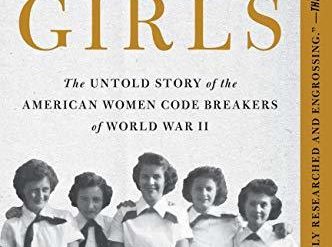






















Hello, and wow thank you for those excellent recommendations! We wanted to share with y’all some of our favourite non fiction nature inspired books, that I could not put down!
https://bodhiwanders.com/2021/11/8-page-turners-for-nature-lovers/
Thank you, Bodhi!
It really helped when you said because it dispels so many of our treasured illusions and takes no prisoners in naming those responsible or providing cures, The New Jim Crow is one of the most significant books written in the English language in a long time. I have a cousin who is doing a research paper this should help him, I’ll share it with him. Thank you for the information about historical nonfiction books about women.